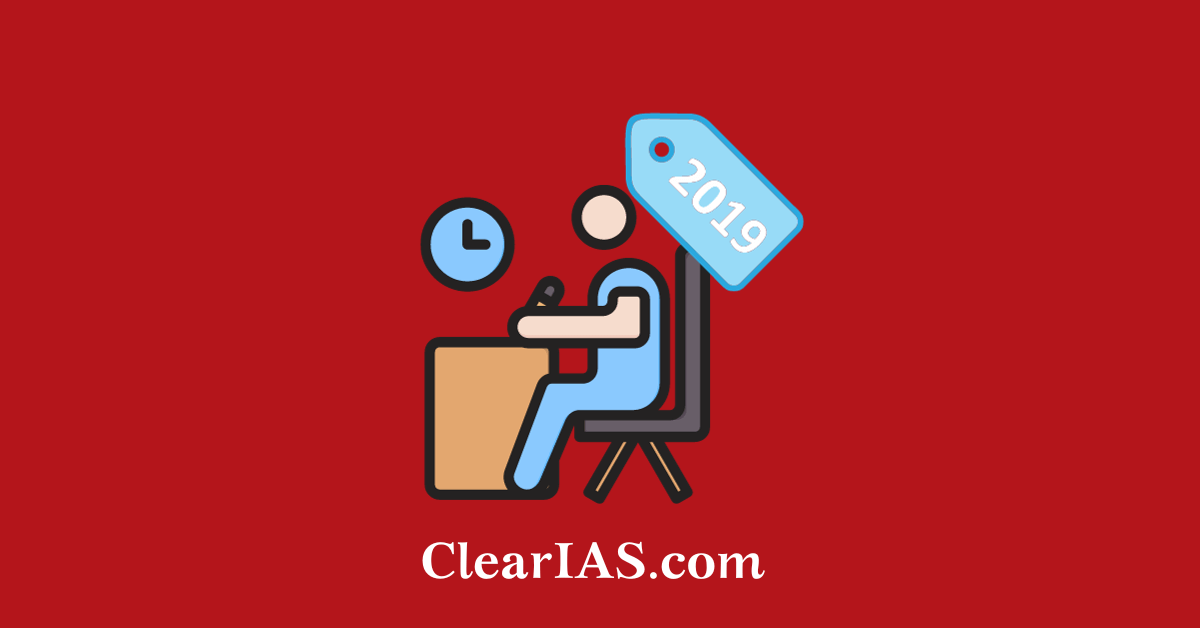 Download General Studies Paper 2 (GS2) UPSC Mains Question Paper – UPSC Civil Services Main Exam (Written) 2019.
Download General Studies Paper 2 (GS2) UPSC Mains Question Paper – UPSC Civil Services Main Exam (Written) 2019.
Union Public Service Commission UPSC conducted the General Studies Paper 2 (GS2) Paper, as part of the Civil Services Main Exam 2019 on 21-09-2019.
Aspirants can now view or download the General Studies Paper 2 (GS2) Question Paper from this post.
GENERAL STUDIES PAPER 2: UPSC Civil Services Mains Examination – 2019
Instructions
- Total Marks: 250 marks, Time duration: 3 hours.
- There are 20 questions printed both in ENGLISH and HINDI.
- All questions are compulsory.
- The number of marks carried by a question/part is printed against it.
- Answers must be written in the medium authorized in the admission certificate which must be stated clearly on the cover of this question-cum-answer (QCA) booklet in the space provided.
- No marks will be given for answers written in a medium other than the authorized one.
- Answers to questions no. 1 to 10 should be in 150 words, whereas answers to questions no. 11 to 20 should be in 250 words.
- Keep the word limit indicated in the questions in mind.
- Any page or portion of the page left blank must be struck off clearly.
General Studies Paper 2 (GS2) Questions – UPSC CSE Mains 2019
Q1. Do you think the Constitution of India does not accept the principle of strict separation of powers rather it is based on the principle of ‘checks and balance’? Explain. (10 Marks)
Q2. “The Central Administrative Tribunal which was established for redressal of grievances and complaints by or against central government employees nowadays is exercising its powers as an independent judicial authority.” Explain. (10 Marks)
Q3. What are the methods used by the farmer’s organizations to influence the policy-makers in India and how effective are these methods? (10 Marks)
Q4. From the resolution of contentious issues regarding the distribution of legislative powers by the courts, the ‘Principle of Federal Supremacy’ and ‘Harmonious Construction’ have emerged. Explain. (10 Marks)
Q5. What can France learn from the Indian Constitution’s approach to secularism? (10 Marks)
Q6. Despite Consistent experience of high growth, India still goes with the lowest indicators of human development. Examine the issues that make balanced and inclusive development elusive. (10 Marks)
Q7. There is a growing divergence in the relationship between poverty and hunger in India. The shrinking of social expenditure by the government is forcing the poor to spend more on non-food essential items squeezing their food budget – Elucidate. (10 marks)
Q8. Implementation of Information and Communication Technology (ICT) based projects/programs usually suffers in terms of certain vital factors. Identify these factors and suggest measures for their effective implementation. (10 marks)
Q9. ‘The time has come for India and Japan to build a strong contemporary relationship, one involving global and strategic partnership that will have a great significance for Asia and the world as a whole.’ Comment. (10 marks)
Q10. ‘Too little cash, too much politics, leave UNESCO fighting for life.’ Discuss the statement in the light of US withdrawal and its accusation of the cultural body as being ‘anti-Israel bias’. (10 marks)
Q11. On what grounds a people’s representative can be disqualified under the Representation of People Act, 1951? Also, mention the remedies available to such a person against his disqualification. (15 marks)
Q12. “Parliament’s power to amend the constitution is limited power and it cannot be enlarged into absolute power”. In light of this statement explain whether parliament under Article 368 of the constitution can destroy the Basic structure of the constitution by expanding its amending power. (15 marks)
Q13. “The reservation of seats for women in the institution of local self-government has had a limited impact on the patriarchal character of the Indian political process”. Comment. (15 marks)
Q14. “The Attorney-General is the chief legal adviser and lawyer of the Government of India.” Discuss (15 Marks)
Q15. Individual parliamentarians’ role as national lawmaker is on a decline, which in turn, has adversely impacted the quality of debates and their outcome. Discuss. (15 marks)
Q16. ‘In the context of the neo-liberal paradigm of developmental planning, multi-level planning is expected to make operations cost-effective and remove many implementation blockages’- Discuss (15 marks)
Q17. The need for cooperation among various service sectors has been an inherent component of development discourse. Partnership bridges the gap among the sectors. It also sets in motion a culture of ‘collaboration’ and ‘team spirit’. In the light of statements above examine India’s development process. (15 marks)
Q18. The performance of welfare schemes that are implemented for vulnerable sections is not so effective due to the absence of awareness and active involvement at all stages of the policy process. Discuss (15 marks)
Q19. “The long sustained image of India as a leader of the oppressed and marginalized nations has disappeared on account of its newfound role in the emerging global order.’ Elaborate (15 Marks)
Q20. What introduces friction in the ties between India and the United States is that Washington is still unable to find for India a position in its global strategy, which would satisfy India’s national self-esteem and ambitions. Explain with suitable examples. (15 Marks)
UPSC CSE General Studies Paper 2 (GS2) Question Paper: Analysis
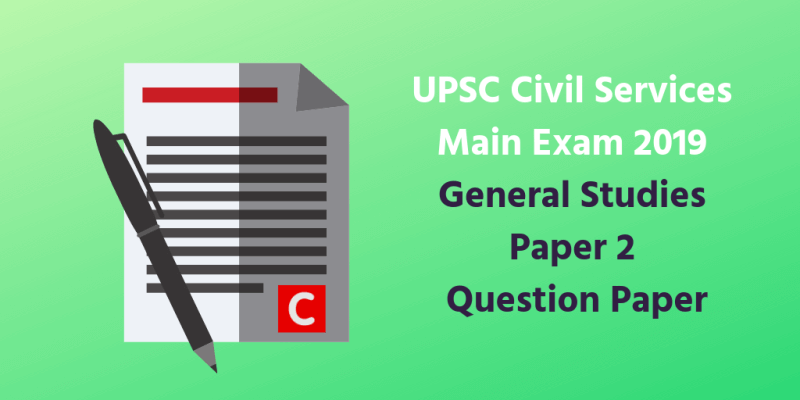
Well, if a relatively static paper like General Studies Paper 1 (History, Geography, Indian Society) was analysis-oriented, how different can General Studies Paper 2 be?
General Studies Paper 2 includes subjects like Indian Polity, Constitution, Governance, Social Justice, International Relations, and the diaspora – all these topics are highly related to current affairs as well.
New preparation methods are required; It should be analysis-oriented!
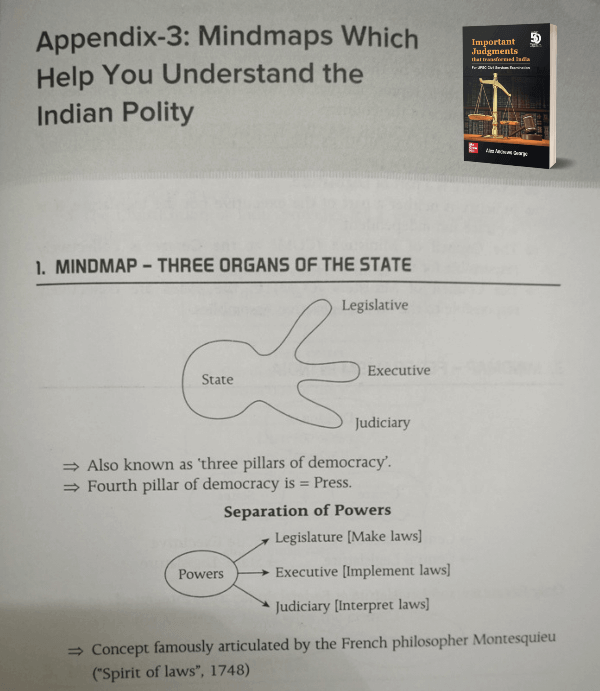
For example, take the first question on the ‘separation of powers’. The question is NOT to just to define the separation of powers, rather the examiner is asking your opinion on whether or not there is a strict separation of powers in India.
However, to analyze the question better, you need to have a clear idea about the separation of powers between the 3 organs of the state – Executive, Legislature, and Judiciary. You may note that this is clearly explained in a mindmap in the book ‘Important Judgment that Transformed India: For UPSC Civil Services Examination‘.
‘Principle of Federal Supremacy’ and ‘Harmonious Construction
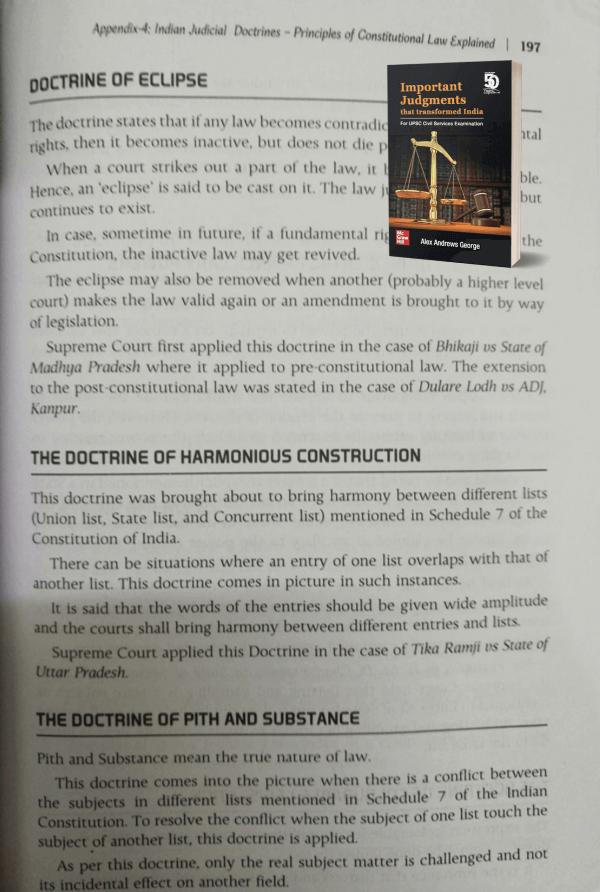
The same is the case with the question on the ‘Principle of Federal Supremacy’ and ‘Harmonious Construction’. You may or may not have heard those terms. However, how should you answer this question?
Merely touching the topic is not enough. That may fetch you only average marks.
To make your answer stand out, you should bring real value into the answer, by coming up with a good analysis. If you can bring your own original thought into the answer, it would be highly appreciated.
UPSC has started to frame questions taking examples for each keyword in the syllabus
- The redressal grievance mechanism is mentioned in the syllabus – the question framed was connected with the Central Administrative Tribunal (CAT)
- ‘Pressure groups’ is a topic mentioned in the syllabus- the question framed was on the influence of farmers’ organizations.
There are many more examples.
How different is the paper, when compared to last year?
Last year, there were many conceptual questions based on static portions of the syllabus like Parliamentary Committees, CAG, Financial Emergency, etc. At least 4 or 5 questions could have been answered from textbooks like ‘Indian Polity by Laxmikanth. However, that was not exactly the case this year.
The priorities of UPSC have changed this year!
We have already alerted our readers, right from the Prelims.
Aspirants just cannot depend solely on NCERT books and a few standard textbooks. That period is long over!
No. We are not saying that you should not read NCERTs or other basic books, but you cannot just stop there now.
You need to further extend your preparation to new sources. Also, apart from knowledge, you need to build your exam skills – be it for Prelims, Mains, or Interview.
The need for the right kind of practice
At least 8 questions could have been answered directly from the online study materials provided by ClearIAS. Many similar questions can also be found in ClearIAS Mock Question Papers for UPSC Mains (and our archives). This once again proves our topic selection expertise, considering that we provide only what is most necessary for UPSC.
Nevertheless, our focus was always to equip you to face the requirements of UPSC, whatever questions may come in.
We feel that most of the questions of GS2 are of a high standard, evoking opinions from the candidates on many items recently in the news. (e.g.: India-US)
Priority Areas of UPSC – Repeated Question Areas
Landmark judgments, parliament’s power to amend the constitution, the basic structure doctrine, etc. are evergreen favorite topics of UPSC. That love has not deteriorated, and we don’t think that will reduce ever – because the understanding of India Constitution and Judiciary is very crucial for a civil servant as well. As you can obviously guess, these topics are given high priority in the book “Important Judgment that Transformed India“.
Preparing for UPSC 2020? Don’t miss the new Bestseller!
‘Important Judgments that Transformed India‘ perfectly explains the concepts of the Indian Constitution/Polity/Judiciary, through an excellent compilation of court cases, mind-maps, and tables.
There is a discount of 20% for the early buyers who order it now!
Order your copy now! Hurry!
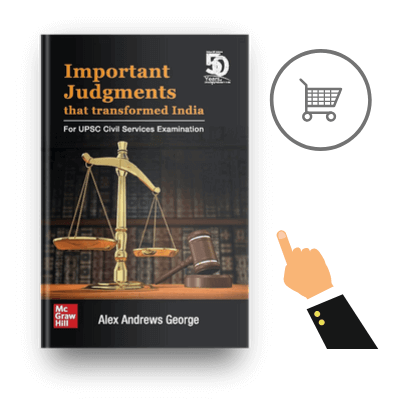






Clearias.com is a very nice and unparallel website amongst the all others. In this website you get all important contents which is useful for UPSC-CSE and designed in a very lucid, easy and organised way as well. Clearias.com is just like a milestones for UPSC students; in this rat race, coveted and prestigious CSE. I love Clearias.com.🙏
@ Kundan – Thank you for the awesome feedback! We work hard to meet expectations like yours, and we’re happy to hear we hit the mark for you.
Very nice
Yeeeah of’course. I would like to thanks entire clearias team from the bottom of my heart. Please always try to launch innovative and smart initiatives which helps students to do smart hard work.🙏🙏